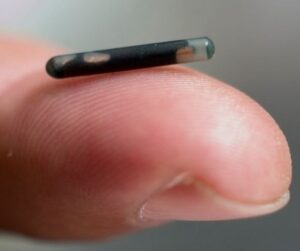Three Alabama state Democrats are proposing a bill that would make it a felony for employers to require staff to have a microchip inserted as a condition of employment. Reps. Prince Chestnut, Kelvin Lawrence, and Anthony Daniels apparently find this particular invasive practice to be a non-starter, saying it infringes on the rights of prospective hires. HB 4 is pre-filed and will be reviewed and argued for or against in the upcoming legislative session.
The bill describes a microchip as “a device subcutaneously implanted in an individual that is passively or actively capable of transmitting personal information to another device using radio frequency technology.”
The bill’s authors have taken into account the best definition for microchips: “The term does not include any device used in the diagnosis, monitoring, treatment, or prevention of a health condition that only transmits information necessary to carry out the diagnosis, monitoring, treatment, or prevention of that health condition.”
The Microchip – It’s Easy
No one in Alabama appears to be using the latest technology in the hiring process at present. Chestnut says, however, he is in pre-emptive strike mode. After reading an article about a Wisconsin business that chips its employees, he told a local outlet, “I was like, Well, that doesn’t seem like a good thing to do. Next, folks are probably going to be requiring folks to get a chip just to work.”

(Photo By MediaNews Group/Reading Eagle via Getty Images)
Chestnut was referring to Three Square Market, a technology business in River Falls, WI. The company chipped 80 employees, allowing them to open building doors, access their computers, and wave their hands at the vending machine for a candy bar.
A Swedish startup, Epicenter, was the first to deploy microchip technology for humans: The company made the news back in 2021 by using microchips to verify COVID vaccination status. Hannes Sjoblad, Chief Disruption Officer, says Epicenter has been working for years to develop human technological advances. IT industry and many other business leaders fully believe that half of all Americans will be chipped by 2025. But Tech 2025, an organization founded in 2017 as an “emerging technology futurist community,” warns of legislative pushback. If Alabama passes HB4, it will join Arkansas, California, Indiana, Missouri, Montana, Nevada, New Hampshire, North Dakota, Oklahoma, Utah, and, ironically, Wisconsin in making the practice of requiring employee chipping a felony.
And then there’s Kevin Warwick, the first human ever microchipped in 1998: Perhaps consider him patient zero. In 2000, he detailed his plans to become one with his computer – effectively, a cyborg: “I was born human. But this was an accident of fate – a condition merely of time and place,” Warwick stated. “I believe it’s something we have the power to change.”
It gets better. “I can envision a future when we send signals so that we don’t have to speak. Thought communication will place telephones firmly in the history books.”
It’s Doable, But Why Do It?
Lauren Christopher, associate professor of electrical and computer engineering at Indiana University-Purdue University, Indianapolis, reminds us we’ve been living with microchips in clothing tags, debit and credit cards, and hotel rooms, to name a few examples. But Christopher also believes there is a tremendous social stigma to chipping humans. As the professor notes:
“That’s not a technology question, it’s more of a social question, whether people want to be [microchipped] or not. I don’t know that I would do it just as a person. Why would I need to? It can be done, technically, but should it be done? It’s more of a social/government question.”
“Any kind of radio frequency that goes over the air … can be intercepted,” Christopher continued, “and even if they’re encrypted, they can be decrypted.”
The three Alabama Democrats remain stalwart in their desire to stop this kind of technology if and when it becomes a mandatory requirement for hiring. As Chestnut pointed out, “Individual liberty and freedom of movement should always remain sacrosanct. Your right to work should not result in your employer being able to trace your steps and place you under a constant state of 24-hour-a-day, seven-day-a-week surveillance.”
Do you have an opinion about this article? We’d love to hear it! If you send your comments to [email protected], we might even publish your edited remarks in our new feature, LN Readers Speak Out. Remember to include the URL of the article along with your name, city, and state.
Please respect our republishing guidelines. Republication permission does not equal site endorsement. Click here.

